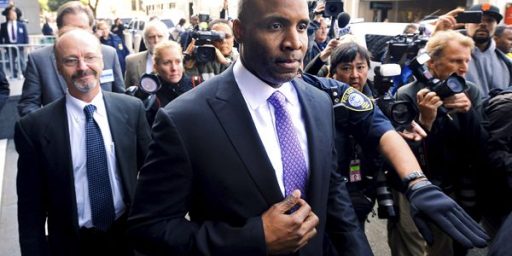National Security Letters Ruled Unconstitutional
A federal judge has ruled National Security Letters violate the First Amendment's free speech guarantees.
A federal judge has ruled National Security Letters violate the First Amendment’s free speech guarantees.
Kim Zetter Wired (“Federal Judge Finds National Security Letters Unconstitutional, Bans Them“):
Ultra-secret national security letters that come with a gag order on the recipient are an unconstitutional impingement on free speech, a federal judge in California ruled in a decision released Friday.
U.S. District Judge Susan Illston ordered the government to stop issuing so-called NSLs across the board, in a stunning defeat for the Obama administration’s surveillance practices. She also ordered the government to cease enforcing the gag provision in any other cases. However, she stayed her order for 90 days to give the government a chance to appeal to the Ninth Circuit Court of Appeals.
“We are very pleased that the Court recognized the fatal constitutional shortcomings of the NSL statute,” said Matt Zimmerman, senior staff attorney for the Electronic Frontier Foundation, which filed a challenge to NSLs on behalf of an unknown telecom that received an NSL in 2011. “The government’s gags have truncated the public debate on these controversial surveillance tools. Our client looks forward to the day when it can publicly discuss its experience.”
The telecommunications company received the ultra-secret demand letter in 2011 from the FBI seeking information about a customer or customers. The company took the extraordinary and rare step of challenging the underlying authority of the National Security Letter, as well as the legitimacy of the gag order that came with it.
Both challenges are allowed under a federal law that governs NSLs, a power greatly expanded under the Patriot Act that allows the government to get detailed information on Americans’ finances and communications without oversight from a judge. The FBI has issued hundreds of thousands of NSLs over the years and has been reprimanded for abusing them — though almost none of the requests have been challenged by the recipients.
Paul Ellis, AP (“Judge rules secret FBI letters unconstitutional“):
They’re called national security letters and the FBI issues thousands of them a year to banks, phone companies and other businesses demanding customer information. They’re sent without judicial review and recipients are barred from disclosing them.
On Friday, a federal judge in San Francisco declared the letters unconstitutional, saying the secretive demands for customer data violate the First Amendment.
The government has failed to show that the letters and the blanket non-disclosure policy “serve the compelling need of national security,” and the gag order creates “too large a danger that speech is being unnecessarily restricted,” U.S. District Judge Susan Illston wrote.
Illston is a longtime district court judge, having been appointed to the bench by Bill Clinton in 1995. The result here strikes me as obvious, although I do note with some amusement that judges issue gag orders, restraining speech related to cases in their court, all the time. There, though, there’s a rather obvious public policy interest.







Come again? Natural security letters have existed since 1978.
@Timothy Watson:
Borrowing heavily from Wikipedia, it seems the sea change came in 1993:
The oldest NSL provisions were created in 1978 as a little-used method of circumventing the Right to Financial Privacy Act. Used in terrorism and espionage investigations, it was limited to foreign powers or persons who the FBI had reasonable cause to believe were agents of a foreign power.
A 1993 amendment relaxed the restriction regarding “foreign powers” and allowed the use of an NSL to obtain information on persons not under direct investigation.
In 2001, section 505 of the USA PATRIOT Act greatly expanded the use of the NSL.
It’s rare nowadays a federal judge pushes back against the surveilance state. This made my day when I learned of it this morning.
Yeah, but there’s a big difference between issuing such an order after a public hearing in which both parties are permitted to present argument and evidence to support their case, and allowing the FBI to issue its own warrant without even pro forma review by a court and banning anyone from even questioning the decision.
There’s a public policy interest in the NSL gag order, too: keeping people from alerting terrorist suspects to an investigation.
That being said, I agree with the judge’s decision. NSLs have become a convenience tool for the FBI, and their use far too frequent. The gag order applies in every case, regardless of whether or not it actually protects the investigation, and even if the recipient is not a target of the investigation. The lack of oversight means the FBI has issued NSLs ordering the recipients to turn over information that should have required a warrant.
“Friggin people, you have no idea how to defend a nation, all you did was weaken a country today Caffey, that’s all you did…you put peoples lives in danger. Sweet dreams son.”